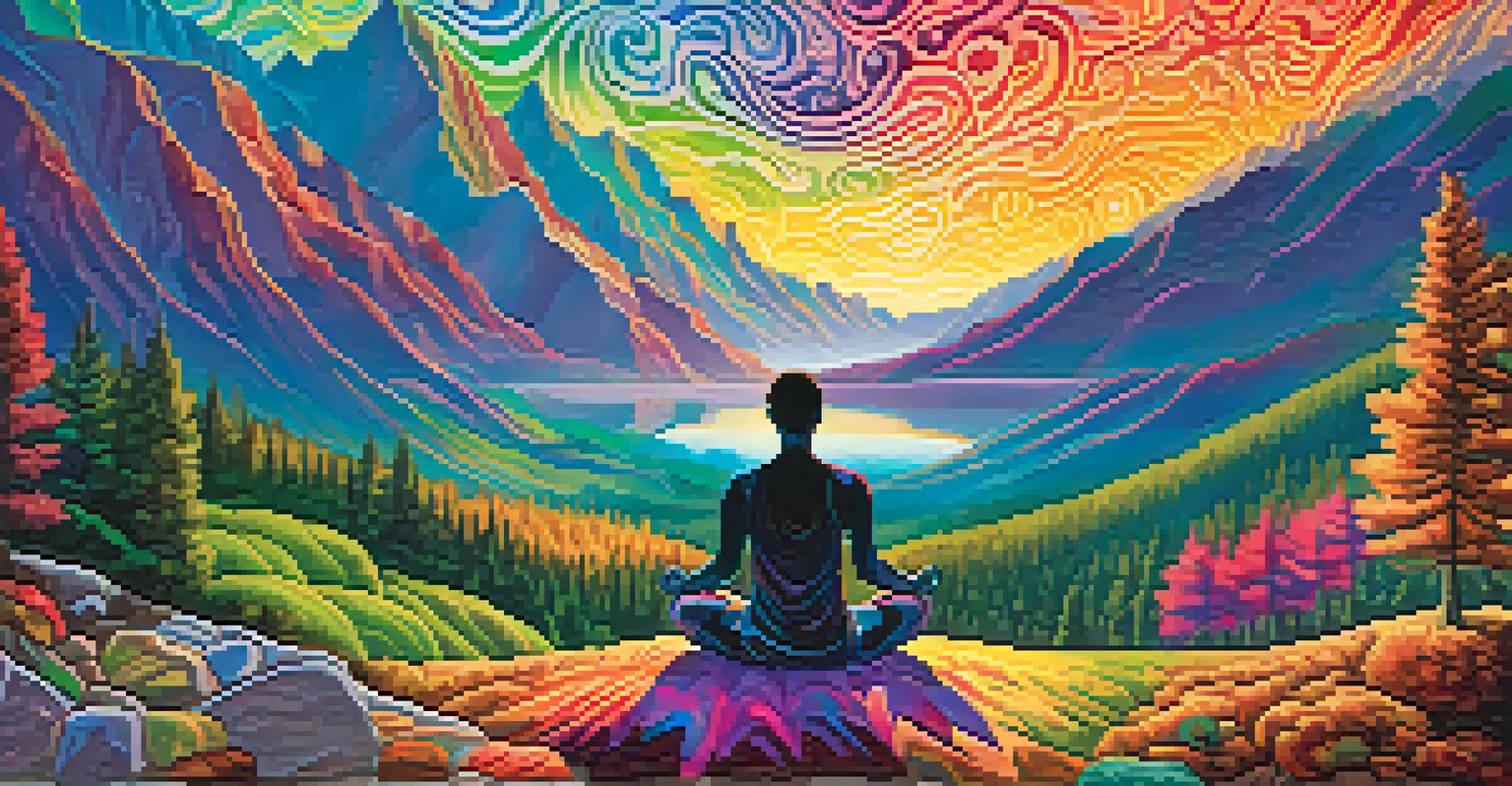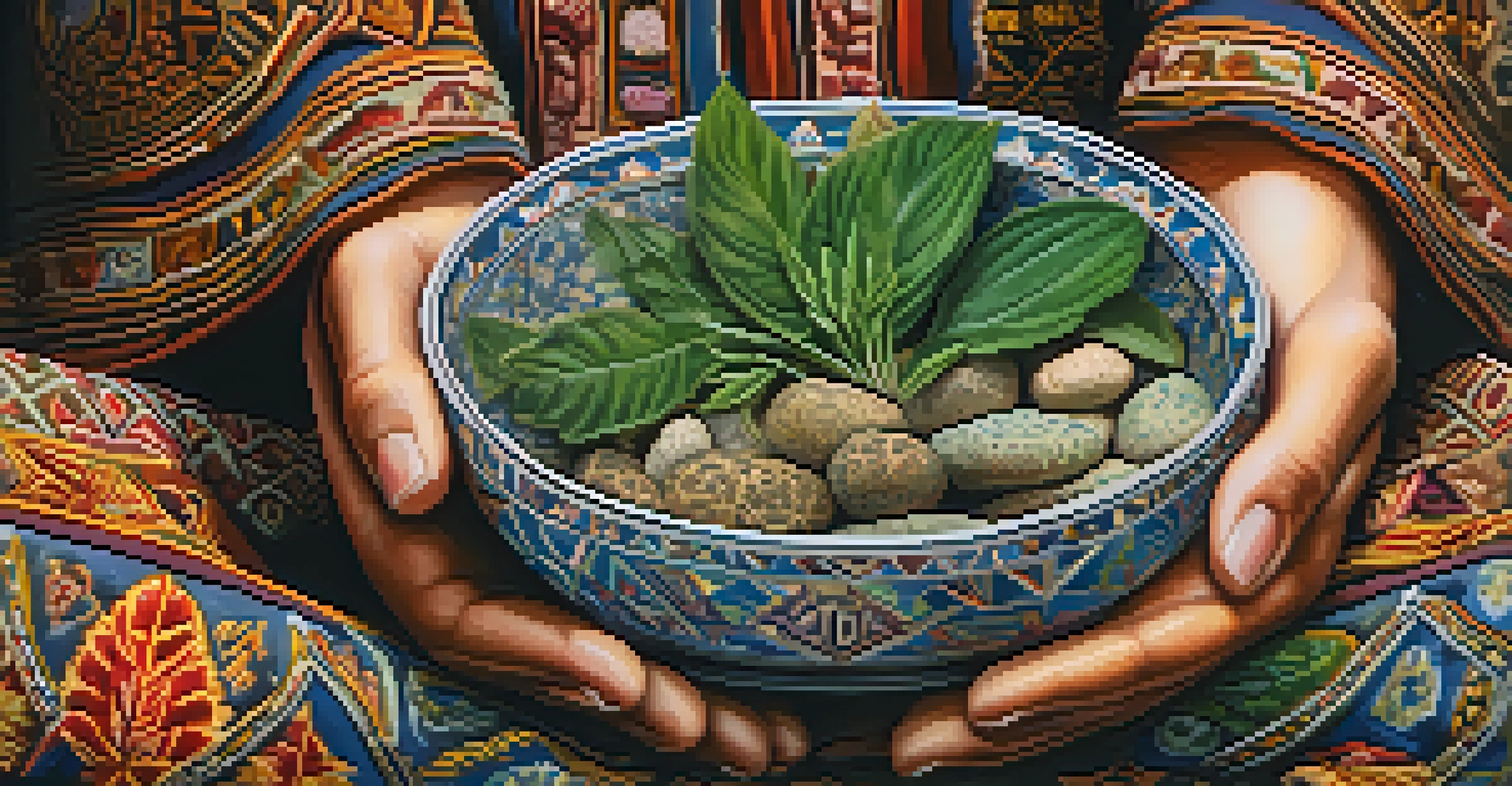The Intersection of Psychedelics and Racial Justice Movements

Understanding Psychedelics and Their Historical Context
Psychedelics, substances that alter perception and cognition, have been used for centuries in various cultures. Historically, these substances were often tied to spiritual and healing practices, particularly among Indigenous communities. However, in the 20th century, they became stigmatized, largely due to their association with counterculture movements and subsequent legal restrictions.
The greatest tool we have for social change is our ability to connect with one another on a deeper level and understand each other's struggles.
As these substances have resurfaced in modern discussions, their potential therapeutic benefits are being recognized once again. Research indicates that psychedelics may help treat mental health issues like PTSD and depression, which disproportionately affect marginalized communities. This revival prompts a reevaluation of their place in society, especially in the context of social justice.
Understanding the historical narrative around psychedelics is crucial to framing their current role in racial justice movements. It highlights the need to address the inequalities in drug policies that have targeted specific communities, particularly people of color, while also recognizing the cultural significance these substances hold in various traditions.
The Role of Psychedelics in Healing and Community Building
Psychedelics are increasingly viewed as tools for healing, not just on an individual level but within communities. For many, these substances facilitate deep introspection and connection, allowing individuals to confront trauma and foster empathy towards others. This communal aspect can be particularly powerful in racially diverse groups seeking to address shared histories of oppression.

The therapeutic use of psychedelics has been integrated into workshops and retreats designed for marginalized communities. These safe spaces encourage participants to explore their experiences and emotions, often leading to profound breakthroughs. As participants share their stories, they build solidarity and understanding, crucial elements in any movement for racial justice.
Psychedelics and Healing Communities
Psychedelics are being recognized as tools for healing that foster deep connections and empathy within marginalized communities.
Furthermore, the community-focused approach of psychedelic therapy can dismantle barriers that often exist in traditional mental health care. By centering the voices and experiences of marginalized individuals, these movements promote inclusivity and emphasize the importance of collective healing.
Psychedelics and the Fight Against Systemic Oppression
Systemic oppression manifests through various societal structures, including healthcare, law enforcement, and education. Psychedelics can serve as a catalyst for social change by helping individuals confront and challenge these oppressive systems. Many advocates argue that expanding access to psychedelics can empower communities historically marginalized by these systems.
Healing is not just about the individual; it’s about the community and how we come together to create change.
When people engage in psychedelic experiences, they often report a heightened sense of awareness regarding social injustices. This awareness can fuel activism and motivate individuals to take action against systemic racism and inequality. By fostering a deeper understanding of collective suffering, psychedelics may inspire movements that demand change.
Moreover, discussions around the legalization and decriminalization of psychedelics can highlight the racial disparities present in drug enforcement policies. Addressing these disparities not only contributes to racial justice but also allows for a broader conversation about the rights of individuals to access these substances for healing.
Racial Justice Movements Embracing Psychedelic Practices
Several racial justice movements are beginning to incorporate psychedelic practices into their frameworks. Organizations are hosting events that blend activism with mindfulness and healing practices, using psychedelics as a tool for transformation. This integration fosters a unique approach to social justice that emphasizes personal growth as a pathway to collective change.
These movements often focus on creating safe environments where individuals can share their experiences with psychedelics and discuss their implications in a broader social context. By doing so, they aim to destigmatize these substances while also educating participants about their potential benefits and risks.
Confronting Systemic Oppression
Engaging with psychedelics can heighten awareness of social injustices and empower individuals to challenge systemic racism.
The blending of psychedelics with racial justice activism not only enriches the dialogue around both topics but also empowers individuals to envision a more equitable future. Through these practices, participants can tap into their inner wisdom and resilience, reinforcing their commitment to social justice.
Challenges and Criticisms of Psychedelics in Activism
Despite the growing interest in psychedelics within racial justice movements, there are challenges and criticisms to consider. One concern is the potential for cultural appropriation, particularly when individuals outside of Indigenous traditions adopt these practices without understanding their significance. It’s essential to approach psychedelics with respect for their historical and cultural contexts.
Additionally, there is a risk of commercialization overshadowing the healing and communal aspects of psychedelics. As interest in these substances grows, the market could prioritize profit over people, leading to exploitative practices that further marginalize already vulnerable communities. Ensuring that access remains equitable is crucial for the integrity of these movements.
Critics also highlight the need for thorough education regarding the safe use of psychedelics. While they can offer profound insights, they also come with risks, particularly if used irresponsibly. Promoting informed, responsible use within the context of activism is key to fostering a safe and supportive environment.
The Future of Psychedelics and Racial Justice
The intersection of psychedelics and racial justice presents a promising yet complex landscape. As research continues to uncover the therapeutic benefits of psychedelics, there is potential for these substances to play a significant role in healing communities affected by systemic oppression. However, navigating this path requires careful consideration of ethics, access, and cultural sensitivity.
Looking ahead, ongoing dialogues surrounding the decriminalization and legalization of psychedelics can pave the way for more inclusive policies that prioritize marginalized voices. Advocating for equitable access can help dismantle the harmful legacies of the War on Drugs, which disproportionately impacted communities of color.
Racial Justice and Psychedelic Practices
Racial justice movements are incorporating psychedelics to blend activism with personal growth, promoting collective healing and understanding.
Ultimately, the future of psychedelics in the context of racial justice will depend on community engagement, education, and a commitment to social equity. By centering the experiences of those most affected by injustice, we can create a more inclusive and compassionate society.
Conclusion: Bridging Healing and Activism
As we explore the intersection of psychedelics and racial justice, it becomes clear that there is a profound connection between personal healing and societal change. Psychedelics offer opportunities for individuals to confront their pain and biases, fostering empathy and deeper understanding of collective struggles. This process can ignite passion for activism and social change.
However, it is crucial to approach these discussions with intention and respect for the cultures from which these practices originate. By prioritizing inclusivity and equity in the conversation, we can ensure that the benefits of psychedelics are accessible to all, particularly those who have been historically marginalized.

In bridging the gap between healing and activism, we can cultivate spaces where individuals are empowered to not only heal themselves but also their communities. The journey towards racial justice is ongoing, and psychedelics may hold a key to unlocking the transformative potential within us all.